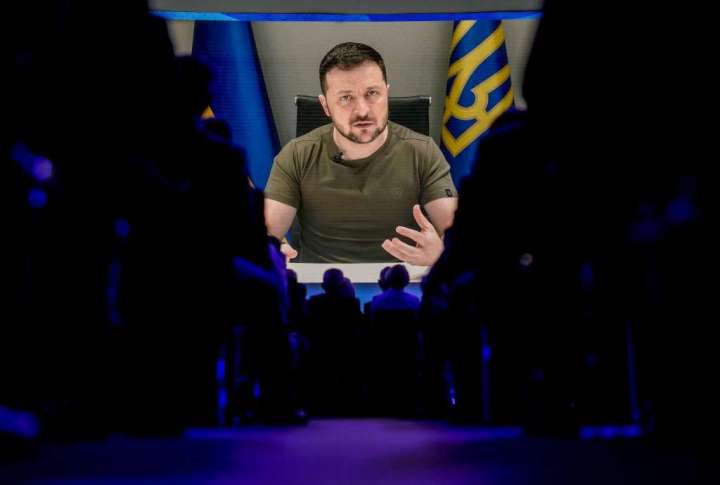The World Economic Forum in Davos, Switzerland, is usually fixated on the future. Most years, the attendees are dazzled by some country, company or technology promising to burst forward, force change and dominate the next decade.
The one hopeful sign coming out of Davos this year

In past years in Davos, companies plastered storefronts and buildings with jubilant signs cheering on dynamism, acceleration and disruption. This time, there were far fewer placards and slogans (some of them meekly promising sustainability or progress on climate change). The one genuinely cheerful sign I saw said, “Will the Saudi GDP now be fuelled by YOLO, FOMO and WYWH?” With oil at over $100 a barrel, the Saudi regime has much to be excited about.
The storefront that dominated attention was one that used to be booked for years by Russians, who hosted lavish cocktail parties and caviar tastings there. Now it has a sign in the window that reads in small, clear type, “This used to be the Russian House in Davos. Now it’s the Russian War Crimes House in Davos.” Sponsored by Ukrainian businessman Victor Pinchuk, the new look includes rooms filled with striking images and stories of Russia’s barbaric actions in its campaign against Ukraine.
Follow Fareed Zakaria‘s opinions
FollowUkraine dominated Davos this year, and most people I spoke to were quite unsure how this war would end. That played into a larger sense of uncertainty about the world that we are heading into, a world of multiplying risks. “We know the risks that are out there are large,” Tharman Shanmugaratnam, Singapore’s senior minister, told me. “They are not about black swan events, coming out of the blue. A pandemic was predicted; Russia’s invasion was a known possibility. Another pandemic, more frequent climate crises, these are not just possible but likely. We can’t keep expecting and planning for a return to calm, untroubled times.”
A former central banker told me that economic policymakers felt that they were in uncharted territory: “The old model — where inflation moves up ever so slightly, and then you raised rates a tiny bit and all was well — that’s dead. We’re in a new world, and we’re all just experimenting.”
There is a broader foreboding, a sense that the period we have just lived through — the three decades since 1990 — might have been an unusual, perhaps even unique era, one in which the great-power politics and geopolitical tensions that normally dominate and define international life were absent. The giddy trends of recent times — globalization, the information revolution, democratization — were trends built on an edifice of power, the United States’ superpower status. But that strength has been waning for some years — following Iraq, the global financial crisis, covid-19 — and now is being challenged, first by China and then Russia.
In all this gloom, there is one distinctly hopeful sign. Europe is acting with a greater sense of unity and purpose than I have ever seen before. Every European leader I spoke with believed that Russia’s aggression has sparked a revolution of sorts across the continent. The European Union has shown remarkable unity on sanctions and is slowly but steadily coming together on energy policy.
These successes could evolve into greater coordination on foreign and even defense policy. Europeans have realized, at a fundamental level, that they were taking peace and stability for granted, and that it might now have to be created and sustained by hard work and commitment, in part by building hard power of their own and deploying it strategically. There are serious debates about ending the slow, consensual process of E.U. decision-making that allows one country, such as Hungary, to veto its efforts. The most lasting legacy of this crisis could be a new role for Europe as a more purposeful strategic actor on the world stage. But for that to happen, this experience in uniting against Russia has to work. Only success can breed more success. Failure will doom this experiment.
The founding fathers of the European Union — like Robert Schuman and Jean Monnet — were steeped in history and determined to ensure that war did not break out again in Europe. Today’s European leaders need to infuse their day-to-day decisions with a similar sense of history. Fifty years from now, no one will remember whether growth slowed on the continent for a couple of quarters in 2022 or if Brussels had to pay extra for natural gas from the United States. What they will recall is the answer to one question: Who won the war in Ukraine — Vladimir Putin or the West?






